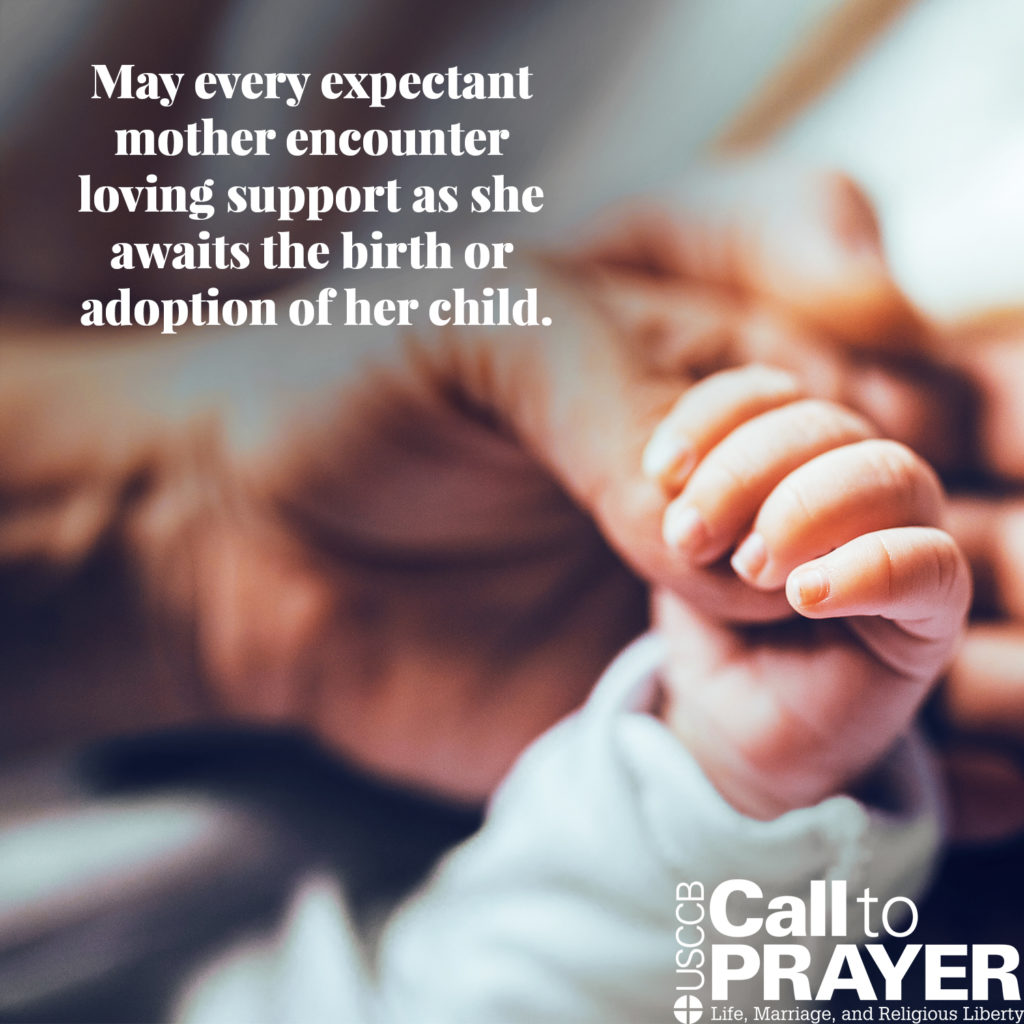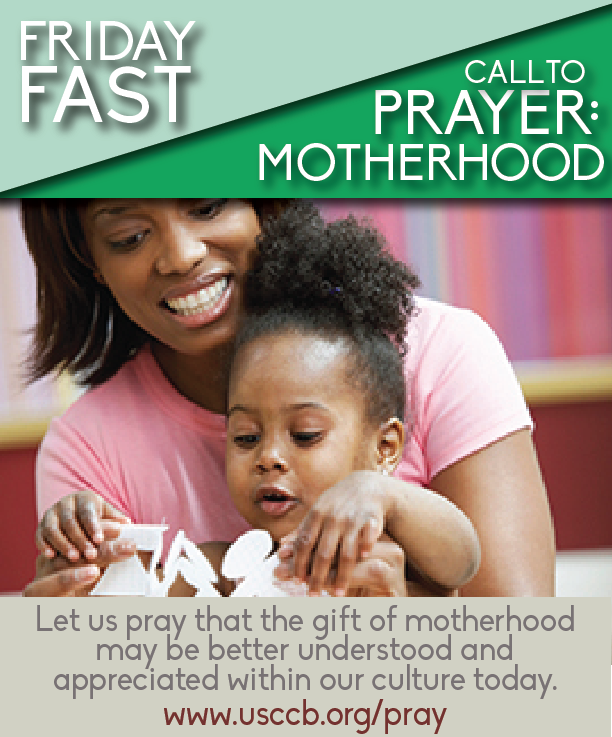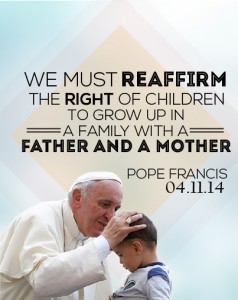Made for Love Minisode: A Mother’s Love
Mary’s son made a surprise announcement one Sunday: I’m no longer Catholic or Christian, and by the way, I’m gay.
Archive
Call to Prayer: May 11, 2018
Archive
Made for Love Ep 12: Bishops have Moms, Too!
Bishops have Moms, too!
On this episode of Made for Love, bishops speak about their mothers and celebrate the gift that motherhood is for the Church and the world. Bishops Caggiano (Bridgeport), Mansour (Eparchy of St. Maron of Brooklyn), Paprocki (Springfield, IL), Ricken (Green Bay), and Sis (San Angelo).
Archive
Amoris Laetitia: Mothers and Fathers
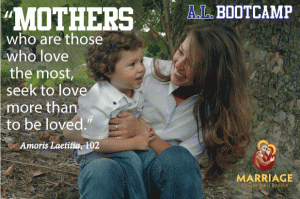 Theresa Farnan, Ph.D. is currently an adjunct member of the philosophy department at Franciscan University of Steubenville and a consultant to the USCCB Committee on Laity, Marriage, Family Life and Youth. Find more of her work on her website.
Theresa Farnan, Ph.D. is currently an adjunct member of the philosophy department at Franciscan University of Steubenville and a consultant to the USCCB Committee on Laity, Marriage, Family Life and Youth. Find more of her work on her website.
With the publication of Amoris Laetitia (AL), Pope Francis offers some timely thoughts on the importance of both mothers and fathers for families. He begins his meditation on “the joy of love experienced by families” (no. 1) by painting a vivid picture of family life. “At the center, we see the father and mother, a couple with their personal story of love. They embody the primordial divine plan clearly spoken of by Christ himself: ‘Have you not read that he who made them from the beginning made them male and female?’ (Mt 19:4)” (no. 9).
Francis reminds us that the “deepest reality” of human couples originates with sexual difference – “it is striking,” he notes, “that the ‘image of God’ here refers to the couple ‘male and female’” (no.10). The fruitful, life-giving love of a man and woman gives rise to the family, a “living reflection” of the “communion of love” that is the Trinity (no. 11).
Throughout Amoris Laetitia, Francis strongly reaffirms the importance of sexual difference as the foundation of marriage, lamenting the “failure to realize that only the exclusive and indissoluble union between a man and a woman has a plenary role to play in society as a stable commitment that bears fruit in new life” (no. 52).
In fact, Francis notes, every child deserves to be loved by both mother and father. “The love of parents is the means by which God our Father shows his own love,” not just individually, through each parent’s love for his or her children, but together, as a couple whose love for each other is the foundation of the family (no. 170). Husband and wife, father and mother, both “cooperate with the love of God the Creator, and are, in a certain sense, his interpreters.” Together “they show their children the maternal and paternal face of God” (no. 172).
Mothers and fathers have different relationships with their children. Pope Francis, in a beautiful tribute to mothers, praises their warmth and their tenderness, their dedication and moral strength, all of which help the child “develop a capacity for intimacy and empathy” (nos. 174-175). Fathers are equally important, mediating between the child and the world, helping the child “to perceive the limits of life, to be open to the challenges of the wider world and to see the need for hard work and strenuous efforts” (no. 175).
Francis laments individualism that sees motherhood as a threat to women’s freedom, and offers men a confused understanding of masculinity that devalues fatherhood, commitment, and responsibility (see nos. 173, 176). At the same time, he rejects a rigid division of roles and responsibilities, reminding us that it is the “clear and well-defined presence of both figures, male and female” that best allows children to flourish (no. 175).
In his discussion of the importance of the presence of mothers and fathers, we can see the unique stamp of Francis’s pastoral theology of accompaniment. The family – founded on the loving union of a man and woman – is the primary school in the art of accompaniment, where a child is loved and learns to love.
Archive
Being Motherly When You Don’t Have Children
I may seem unqualified to write a reflection on motherhood. After all, I’m not (technically) a mother; I don’t have any children. However, this apparent lack does give me a unique insight into the beautiful truth that all women are called to be motherly as a way of living out our unique dignity and vocation as women.
All of us, men and women, have the same fundamental vocation: to love (see St. John Paul II, Familiaris Consortio, no. 11). The way women live out our vocation to love is profoundly shaped by our capacity to welcome and give birth to new life. Recent popes have stressed that this capacity is not just biological but affects us down to the core of our identity as women. Being apt-for-motherhood is inseparable from who we are.
Pope Francis pointed to this truth in his apostolic exhortation Amoris Laetitia: “Motherhood is not a solely biological reality, but is expressed in diverse ways” (no. 178). St. Pope John Paul II gave us ample guidance on what these “diverse ways” of expressing motherhood are. At the heart of motherhood, he said, is “a special openness” to a new child, an “interior readiness” to accept him or her, and “a special communion with the mystery of life” (Mulieris Dignitatem, no. 18). While these characteristics are easy to see in the actual conception and birth of a child, this attitude of openness, welcome, and closeness to the mystery of life can be seen in myriad other ways of living out one’s motherhood, such as a concern for the needy and vulnerable, an attentiveness to other people, and generous service to others (see Mulieris Dignitatem, no. 21; and John Paul II, Letter to Women, nos. 9 and 12).
Put another way, conceiving and giving birth to a child, while praiseworthy in an era that often rejects the gift of life and fails to protect the child in the womb, is still only the threshold of motherhood in all its fullness. Motherhood finds its deepest meaning in a concerted effort to do God’s will, to receive another person fully and to generously seek his or her good. Jesus said, “My mother and my brethren are those who hear the word of God and do it” (Luke 8:21). This motherhood is not always the mother-and-child tableau that first comes to mind. Some of the more “hidden” forms could include a mother who places her beloved child with an adoptive family, seeking the child’s flourishing despite her own aching heart; a mother who says goodbye to several children before others even knew they existed, carrying them always in her heart despite her empty arms; a wife not granted the gift of new life but who pours herself out in the service of her extended family; a godmother who steps up as a motherly presence for her godchild when his parents’ lives get hectic; a woman who notices when a co-worker is struggling and offers to help; and so on. These and so many other ways are how all women can live out their motherhood! And they are ways women, even those not blessed with physical motherhood, can affirm the goodness of each and every person, the gift that each child is (truly a gift; not deserved), and how all are called to welcome life at all its stages.
Bethany Meola is an Assistant Director in the Secretariat for Laity, Marriage, Family Life, and Youth
Archive
Pope Francis on Mothers
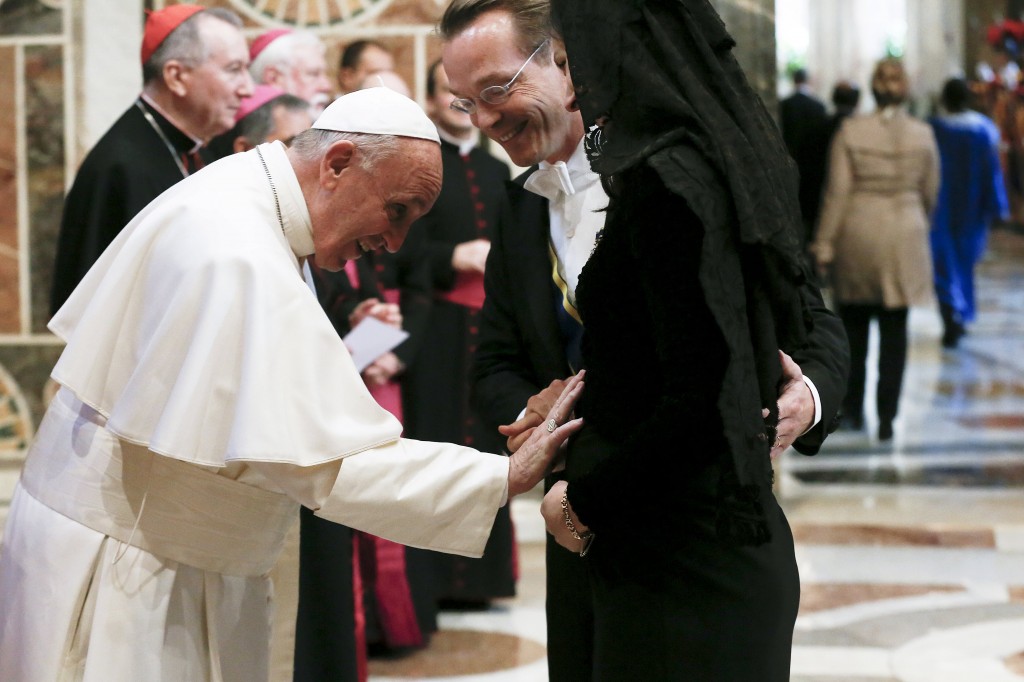
Pope Francis greets an ambassador and his wife during an audience with the diplomatic corps at the Vatican Jan.11. (CNS photo/Alessandro Bianchi, Reuters) See POPE-DIPLOMATS Jan. 11, 2015.
Happy Mother’s Day from Pope Francis and Amoris Laetitia!
On tenderness:
“Let us consider the moving words of Psalm 131. As in other biblical texts (e.g., Ex 4:22; Is 49:15; Ps 27:10), the union between the Lord and his faithful ones is expressed in terms of parental love. Here we see a delicate and tender intimacy between mother and child: the image is that of a babe sleeping in his mother’s arms after being nursed. As the Hebrew word gamûl suggests, the infant is now fed and clings to his mother, who takes him to her bosom. There is a closeness that is conscious and not simply biological” (no. 28).
On pregnancy and expecting a child:
“Pregnancy is a difficult but wonderful time. A mother joins with God to bring forth the miracle of a new life. Motherhood is the fruit of a ‘particular creative potential of the female body, directed to the conception and birth of a new human being’. Each woman shares in ‘the mystery of creation, which is renewed with each birth’. The Psalmist says: ‘You knit me together in my mother’s womb’ (Ps 139:13). Every child growing within the mother’s womb is part of the eternal loving plan of God the Father: ‘Before I formed you in the womb I knew you, and before you were born I consecrated you’ (Jer 1:5)… A pregnant woman can participate in God’s plan by dreaming of her child. “For nine months every mother and father dreams about their child… You can’t have a family without dreams. Once a family loses the ability to dream, children do not grow, love does not grow, life shrivels up and dies’ (nos. 168-169).
“Expectant mothers need to ask God for the wisdom fully to know their children and to accept them as they are” (no. 170).
“With great affection I urge all future mothers: keep happy and let nothing rob you of the interior joy of motherhood. Your child deserves your happiness. Don’t let fears, worries, other people’s comments or problems lessen your joy at being God’s means of bringing a new life to the world. Prepare yourself for the birth of your child, but without obsessing, and join in Mary’s song of joy: ‘My soul proclaims the greatness of the Lord and my spirit exults in God my Savior, for he has looked with favor on the lowliness of his servant’ (Lk 1:46-48). Try to experience this serene excitement amid all your many concerns, and ask the Lord to preserve your joy, so that you can pass it on to your child” (no. 171).
On a child’s need for a mother:
“We cannot ignore the need that children have for a mother’s presence, especially in the first months of life. Indeed, ‘the woman stands before the man as a mother, the subject of the new human life that is conceived and develops in her, and from her is born into the world’. The weakening of this maternal presence with its feminine qualities poses a grave risk to our world. I certainly value feminism, but one that does not demand uniformity or negate motherhood. For the grandeur of women includes all the rights derived from their inalienable human dignity but also from their feminine genius, which is essential to society. Their specifically feminine abilities – motherhood in particular – also grant duties, because womanhood also entails a specific mission in this world, a mission that society needs to protect and preserve for the good of all” (no. 173).
“A mother who watches over her child with tenderness and compassion helps him or her to grow in confidence and to experience that the world is a good and welcoming place. This helps the child to grow in self-esteem and, in turn, to develop a capacity for intimacy and empathy” (no. 175).
On society’s need for mothers:
“‘Mothers are the strongest antidote to the spread of self-centered individualism… It is they who testify to the beauty of life’. Certainly, ‘a society without mothers would be dehumanized, for mothers are always, even in the worst of times, witnesses to tenderness, dedication and moral strength. Mothers often communicate the deepest meaning of religious practice in the first prayers and acts of devotion that their children learn… Without mothers, not only would there be no new faithful, but the faith itself would lose a good part of its simple and profound warmth… Dear mothers: thank you! Thank you for what you are in your family and for what you give to the Church and the world’. (no. 174).
For more from Pope Francis on motherhood, read his catechesis from January 7, 2015!
Archive
Friday Fast: May 9
Intention: Let us pray that the gift of motherhood may be better understood and appreciated within our culture today.
Reflection: It is very fitting that we celebrate Mother’s Day during the month dedicated to the most perfect mother, the Blessed Virgin Mary. A mother plays an irreplaceable role in a child’s life. Without our mothers, we would not have been born and therefore would not have the capacity to live out our Catholic faith. In the words of St. John Paul II, “it is precisely those born of earthly mothers…who receive from the Son of God the power to become ‘children of God’ (Jn 1:12)…The history of every human being passes through the threshold of a woman’s motherhood (no 19).”
It is interesting to note that the Church is sometimes referred to as a mother. Just as a mother gives life to her children, so also the Church “brings forth to a new and immortal life the sons who are born to her in baptism (Lumen Gentium, no 64).” Mary, the most perfect mother, is the archetype, or model for the Church because of her unfailing belief and obedience to God’s will. “The Church indeed, contemplating [Mary’s] hidden sanctity, imitating her charity and faithfully fulfilling the Father’s will, by receiving the word of God in faith becomes herself a mother (LG, no 64).”
Did You Know? In 1965, Pope Paul VI wrote an Encyclical entitled “Mense Maio” (Month of May). In this document, he explained that “Since Mary is rightly to be regarded as the way by which we are led to Christ, the person who encounters Mary cannot help but encounter Christ likewise.”
Archive
Pope Francis on Children’s Rights
Pope Francis offered a very clear message today to members of BICE (International Catholic Child Bureau), a Catholic NGO that works to protect the rights and dignity of the child worldwide:
“On a positive note, we must reaffirm the right of children to grow up in a family with a father and a mother capable of creating a suitable environment for the child’s development and emotional maturity.”
Click here for his full address.
Archive
March for Marriage: June 19, 2014
Save the date!
The second March for Marriage will be held in Washington, D.C. on June 19, 2014. Organized by the National Organization for Marriage, this year’s march will be an important opportunity to promote and defend the beauty of marriage as the unique two-in-one-flesh communion of husband and wife.
In an April 7th letter sent to all the bishops of the United States, Bishop Richard J. Malone, chairman of the USCCB Committee on Laity, Marriage, Family Life and Youth, and Archbishop Salvatore J. Cordileone, chairman of the USCCB Subcommittee for the Promotion and Defense of Marriage, encouraged participation in the march. “The March for Marriage will be an important means to promote and defend marriage for the good of our culture, to pray for our federal and state governments, and to stand in solidarity with people of good will. It also complements well the bishops’ Call to Prayer for Life, Marriage, and Religious Liberty (www.usccb.org/life-marriage-liberty). This is a critical time for marriage in our country, as marriage amendments are being struck down by federal courts and appeals of these decisions are being made. We are deeply grateful for any support you can offer for this march.”
————————————
Here are 4 Ways you can get involved and support the March for Marriage:
1.) Spread the Word!
You can help spread the word through social media by posting why you support the March for Marriage by adding the hashtag #Marching4Marriage. Some examples are below:
- I support #Marching4Marriage because kids deserve a mom and a dad.
- I support #Marching4Marriage because running a business shouldn’t mean shutting the door on your beliefs.
- I’ll be #Marching4Marriage because sexual difference is essential to #marriage.
- I support #Marching4Marriage because marriage is the very foundation on which our society stands.
2.) Organize a group to come to DC!
Whether it be a group of friends, your church youth group, an entire diocesan trip, or you and your family, consider traveling to DC in June to defend marriage!
3.) Participate in the National Marriage Lobby Day!
On June 19th, once the March for Marriage has concluded, there will be an opportunity to visit your elected officials and their staff to explain why you defend authentic marriage. For more information on participating in Lobby Day, click here.
4.) Join the Call to Prayer for Life, Marriage, and Religious Liberty!
There are many different ways to participate in the Call to Prayer, both as an individual and as a community. Find out how you can get involved here.
To stay up-to-date on detailed information regarding the March, sign up for alerts at www.marriagemarch.org.
Archive
State Marriage Defense Act introduced in U.S. Senate
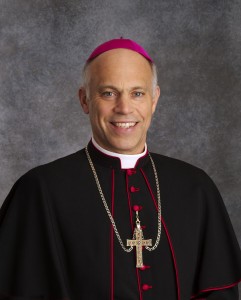 Archbishop Salvatore Cordileone, Chairman for the Subcommittee for the Promotion and Defense of Marriage, strongly endorsed the State Marriage Defense Act of 2014 (S. 2024) introduced in the U.S. Senate by Senator Ted Cruz (R-TX). A companion bill (H.R. 3829) was previously introduced in the U.S. House of Representatives by Representative Randy Weber (R-TX).
Archbishop Salvatore Cordileone, Chairman for the Subcommittee for the Promotion and Defense of Marriage, strongly endorsed the State Marriage Defense Act of 2014 (S. 2024) introduced in the U.S. Senate by Senator Ted Cruz (R-TX). A companion bill (H.R. 3829) was previously introduced in the U.S. House of Representatives by Representative Randy Weber (R-TX).
In a February 28 letter of support to Senator Cruz, Archbishop Cordileone noted that the Department of Justice is the most recent federal agency “to use a ‘place of celebration’ rule rather than a ‘place of domicile’ rule when determining the validity of a marriage for purposes of federal rights, benefits, and privileges.”
“By employing a ‘place of celebration’ rule, these agencies have chosen to ignore the law of the state in which people reside in determining whether they are married. The effect, if not the intent, of this choice is to circumvent state laws defining marriage as the union of one man and one woman,” said Archbishop Cordileone.
Archbishop Cordileone urged the U.S. Senate to pass the State Marriage Defense Act of 2014 and encouraged members to join as cosponsors of the bill stating, “Marriage needs to be preserved and strengthened, not redefined. Every just effort to stand for the unique meaning of marriage is worthy of support.”
The full press release can be found here.
Archive
USCCB Subcommittee Chairman Strongly Supports Amending U.S. Constitution to Protect Marriage
Archbishop Cordileone: Marriage Protection Amendment to the U.S. Constitution is needed
Amendment is only remedy against judicial activism
Elemental truth of marriage deserves highest protection in law
February 19, 2014
WASHINGTON—Expressing strong support for the federal Marriage Protection Amendment (H. J. Res. 51) introduced by Rep. Tim Huelskamp (R-KS) in the U.S. House of Representatives, Archbishop Salvatore Cordileone of San Francisco said, “The amendment would secure in law throughout the country the basic truth known to reason that marriage is the union of one man and one woman.” Archbishop Cordileone , chairman of the U.S. Conference of Catholic Bishops’ Subcommittee for the Promotion and Defense of Marriage, made the comments in a February 19 letter of support to Rep. Huelskamp.
Referencing recent federal court decisions striking down a number of state marriage laws, Archbishop Cordileone said, “An amendment to the U.S. Constitution is the only remedy in law against this judicial activism that may ultimately end with federal judges declaring that the U.S. Constitution requires states, and consequently the federal government, to redefine marriage.” He added, “Just as Roe v. Wade mandated a constitutional right to abortion throughout the country, we now have the possibility of another bad decision mandating a constitutional change in the meaning of marriage in order to promote (at least to begin with) ‘marriages’ between two people of the same sex throughout the country. Your proposed Marriage Protection Amendment to the U.S. Constitution is, therefore, a needed remedy.”
Archbishop Cordileone also said, “Preserving this elemental truth is necessary for the good of society at large and for the good of children who deserve the love of both a mother and a father, neither of whom is expendable. Indeed, marriage is the only institution that unites a man and a woman to each other and to any child conceived of their union.” Archbishop Cordileone also commented on the nature of the recent federal court decisions by saying, “Federal court opinions that essentially redefine marriage to be merely a state recognized arrangement of intimate adult relationships ignore the truth about marriage, which deserves the highest protection in law.”
Archbishop Cordileone urged the U.S. House of Representatives to pass the Marriage Protection Amendment to the U.S. Constitution and encouraged members to join the resolution as cosponsors.
Archbishop Cordileone’s letter can be found online.
For H.J. Res. 51 to amend the U.S. Constitution, it must be approved by two-thirds of the U.S. House of Representatives and U.S. Senate and then be ratified by three-fourths of the states.
Archive
Now Available!
 Marriage: Unique for a Reason is kicking off the first day of National Marriage Week with the release of its newest catechetical film, “El Matrimonio: Hecho para el amor y la vida.” “This is a one-of-a kind resource, and it is my hope that “El Matrimonio” will be a fruitful tool for advancing the conversation in both Spanish- and English-speaking communities on the true meaning of marriage,” said Archbishop Cordileone of the film. The 30 minute Spanish telenovela-style video and bilingual study guide is perfect for clergy, catechists, teachers, other leaders and viewers, as it explores five main themes: sexual difference and complementarity, children, the common good, religious freedom, and persons who experience same-sex attraction.
Marriage: Unique for a Reason is kicking off the first day of National Marriage Week with the release of its newest catechetical film, “El Matrimonio: Hecho para el amor y la vida.” “This is a one-of-a kind resource, and it is my hope that “El Matrimonio” will be a fruitful tool for advancing the conversation in both Spanish- and English-speaking communities on the true meaning of marriage,” said Archbishop Cordileone of the film. The 30 minute Spanish telenovela-style video and bilingual study guide is perfect for clergy, catechists, teachers, other leaders and viewers, as it explores five main themes: sexual difference and complementarity, children, the common good, religious freedom, and persons who experience same-sex attraction.
“The film’s story conveys real difficulties that numerous families encounter, but with compassion and without compromising the truth about God’s loving plan for marriage and family. In this way, the film portrays what we are all called to do: to love without compromising the truth, and to be witnesses to God’s plan with love and mercy. Love and truth go together. I pray that this film will provide opportunities for a deeper and more thoughtful study of, and increased reflection on the gift of marriage.”
The film and accompanying bilingual study guide can be viewed online and is available for purchase at usccbpublishing.org.
For the full press release, click here.
Archive
November 15: Friday Fast
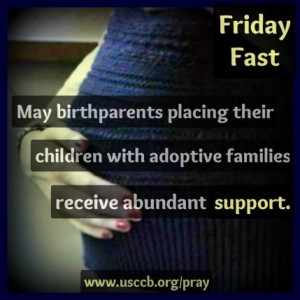 Intention: May birthparents placing their children with adoptive families receive abundant support.
Intention: May birthparents placing their children with adoptive families receive abundant support.
Reflection: Under challenging circumstances, some parents expecting a baby may discern that choosing what’s best for their child means generously placing him or her with an adoptive mother and father. That selfless, courageous decision is far from easy, so it’s vital that we give birthparents our support.
As Cardinal O’Malley encouraged us, “Obviously, we must never abandon our commitment to the unborn child, a precious human being made in the image and likeness of God. But we must learn to focus more on the woman in crisis. We must listen with empathy to be able to communicate the Gospel of Life” (Homily, Opening Mass of the 2013 National Prayer Vigil for Life).
Remembering our own adoption as children of God through Jesus Christ (Eph. 1:5), let us support those who may be considering adoption – both those we know personally in our own lives and those whom we may not have even met.
Did You Know? November is National Adoption Month! In “The Blessing of ‘Unanswered Prayers’: An Adoption Story,” MaryPat St. Jean shares her family’s experience of welcoming four adopted children into their home.
More:
- Learn about the Bishops’ Call to Prayer for Life, Marriage, and Religious Liberty
- Sign the pledge to fast on Fridays for life, marriage, and religious liberty
- Join the Call to Prayer Facebook event
Archive
Is defending marriage just about injuring others? No. Marriage matters for everyone. (5th of 7 in a series)
Note: This post is fifth in a series of posts about what we can learn from the Supreme Court’s June 2013 DOMA decision, and how that can help us better promote and defend marriage. This series is based on a July 2013 talk by staff of the USCCB Subcommittee for the Promotion and Defense of Marriage.
Earlier posts:
- #1: Background to the Supreme Court cases
- #2: Unspoken assumptions & reframing the debate
- #3: What do you say that marriage is? The need for a comprehensive vision
- #4: The flawed anthropology of “sexual orientation”
————————————————————————————————
PART ONE: What we can learn from the Supreme Court
Post #5: Is defending marriage just about injuring others? No. Marriage is good for everyone.
In its ruling on DOMA, the Supreme Court said that laws that define marriage as the union of one man and one woman are inherently suspect because their only justification is a desire to “injure” a class of persons. Indeed, the Court does not mince words when it talks about the purpose of DOMA: “The principle purpose and the necessary effect of this law are to demean those persons who are in a lawful same-sex marriage” (p. 25, emphasis added). DOMA gave a “stigma” to such persons (p. 21) and it instructed them that their marriage is “less worthy” than other marriages (p. 25).
Worse, the Court said that DOMA – and presumably any law that defines marriage as the union of a man and a woman – lacks a “legitimate purpose” (p. 25). In other words, no rational reason exists that would justify a law defining marriage as the union of a man and a woman. No reason, for example, such as the fact that only male-female relationships are capable of conceiving children, who have a vested interest in being raised by their married father and mother.
In his dissent, Justice Scalia rails against the Court’s dismissal of marriage proponents’ arguments as merely cloaks for irrational prejudice against those who desire to marry someone of the same sex. Scalia says that the Court thus made those who still argue for man-woman marriage “enemies of the human race” (p. 21, Scalia dissent). He writes, “In the majority’s judgment, any resistance to its holding is beyond the pale of reasoned disagreement” (p. 21). In other words, the book is closed. There is no room for disagreement. Scalia also said, “In the majority’s telling, this story is black-and-white: Hate your neighbor or come along with us” (p. 25).
Clearly that attitude is a daunting obstacle for those of us who seek to promote marriage as the union of one man and one woman.
Tip number four: Emphasize that promoting and defending marriage is good for everyone.
As stated already, one challenge we face is criticism that the Church is “obsessed” with marriage because she really only cares about married people; she is pro-married couples, but anti-everyone else. Of course we know this is false.
Catholic Social Teaching is a great help here, because it is very clear that marriage and the family matter to society. (And there is no question at all that “marriage” means what it always had for the Church: the union of one man and one woman). For example, the Compendium of the Social Doctrine of the Church [CSDC] describes the family (founded on marriage) as “the primary place of humanization” (no. 209), the “cradle of life and love” (no. 209), the “first and vital cell of society” (no. 2), the place where “one learns social responsibility and solidarity” (no. 213) and so on.
Marriage benefits society, first, by being what it is. The Compendium speaks beautifully of the “dynamism of love” that radiates out from the irrevocable vow that husband and wife give to each other (CSDC, no. 221). Their “yes” to each other lays the foundation for them to say “yes” to any children God gives them, and to say “yes” to all persons, seeing them as valuable for their own sake and not for what they can do and contribute.
And marriage of course benefits society by giving children the best possible chance to be born into a situation where their mother and father have already committed to each other and to any children born from their union. Not every married couple is blessed with children, but every child has a mom and a dad. As the quip goes, “When a child is born, chances are there’s a mother close by. The problem is: Who’s the father?” Marriage solves this cultural dilemma by bringing men and women together before children are conceived, to lay a solid foundation where they can be welcomed into a “sanctuary of life” (CSDC, no. 231ff).
Another way to show that marriage matters for everyone, and is not a mean-spirited jab at those who can’t or won’t get married, is to point out that all of us are sons or daughters. All of us have a father and a mother, and whether those two persons were and still are married to each other makes a great impact on our lives. This is a universal truth, and one that the Church argues should matter for public policy.
Finally, the fact that marriage matters for everyone gives us a way to connect promoting and defending marriage with the New Evangelization. Yes, the New Evangelization means reaching and re-catechizing those who have been baptized but not formed. Those who serve in various ministries can probably think of ways that they are doing this kind of evangelization. Our Catholic people certainly need instruction in the full meaning of marriage; one poll in March 2013 found that over half of Catholics support redefining marriage (although critics pointed out that only 36% of regular mass-goers said they were for redefining marriage). And they need to be given encouragement to stand firm in these teachings, a difficult task in the face of the Supreme Court’s judgment that defending marriage means harming and demeaning others. We of course need to dig deep into the rich, life-giving teaching of the Church on marriage and give it generously to those within the Church.
But there is another connection between the New Evangelization and marriage. In the face of such severe challenges to marriage, it can be tempting to throw up our hands and retreat from the public square, shutting the Church doors tight and vowing to “protect the Sacrament” come what may, but effectively giving up on marriage outside the Church walls. This might seem like a fix – you have your marriage, we have ours – but it would mean giving up on our responsibility to evangelize and it would mean giving up on the fact that marriage matters for everyone.
Contrary to what the Supreme Court said, the bishops are very clear that “to promote and protect marriage as the union of one man and one woman is itself a matter of justice.” (USCCB, Pastoral letter, Marriage: Love and Life in the Divine Plan [2009]: p. 23)
In sum, the challenge of marriage redefinition isn’t going away. On the legal front, we can expect more court battles over marriage’s meaning, more ballot initiatives to defend or redefine marriage, and more challenges to other aspects of marriage. For example, one polygamy activist group celebrated the Court’s ruling, saying, “I think [the court] has taken a step in correcting some inequality, and that’s certainly something that’s going to trickle down and impact us.”
Even more soberly, it seems reasonable to expect continuing clashes between the Church and the government over what marriage is and how much freedom the Church has to hold to the authentic meaning of marriage. Today these challenges are being felt by wedding businesses and government officials, among others. Tomorrow, could they be felt by marriage ministries such as marriage preparation and healing ministries? We say that not to speculate or be fear-mongers, but only to point out that the trend seems to be the government strong-arming people of faith to treat people in same-sex relationships as if they were married husbands and wives.
And on the pastoral front, we can expect more confusion about marriage’s meaning and purpose, evidenced by the quotes we’ve shared from the highest Court in the land. Unfortunately, that’s the situation we find ourselves in. As Justice Scalia stated in his dissent: “…we will have to live with the chaos created by this [decision]” (p. 8, Scalia dissent). But are we just going to live with this chaos? Not us. How about you?
Next: On to Part Two: Practical Ways to Promote and Defend Marriage
Archive
USCCB News Release: Archbishop Cordileone Calls Minnesota's Move to Redefine Marriage Shortly After Mother's Day the "Height of Irony"
USCCB News Release (May 15, 2013)
- Men and women bring different gifts to parenting
- Redefining marriage in law serves no one’s good
- Truth of marriage not going away
“It is the height of irony that the Minnesota legislature decided, and the governor signed into law, the redefinition of marriage just after we celebrated the unique gifts of mothers and women on Mother’s Day,” said Archbishop Salvatore Cordileone of San Francisco. Archbishop Cordileone chairs the U.S. Conference of Catholic Bishops’ Subcommittee for the Promotion and Defense of Marriage. He said further, “It is all the more so given the fact that in the last election Minnesotans were led to believe that there was no need to define marriage in the constitution, that nothing would change if the marriage amendment didn’t pass.”
“It also renders senseless the very idea of President Obama’s National Fatherhood Initiative, in that a bill now becomes law in Minnesota that effectively claims that a mother and a father together are superfluous and can be replaced by two men or two women,” he added.
Archbishop Cordileone noted that Minnesota is the third state in just over a week to redefine marriage in the law.
“There are many of us Americans, including many Minnesotans, who stand for the natural and true meaning of marriage. They know that men and women are important; their complementary difference matters, their union matters, and it matters to kids. Mothers and fathers are simply irreplaceable,” he said. “Instead of strengthening, the Minnesota legislature’s decision to redefine marriage weakens motherhood and fatherhood, and so strikes a blow to all children who deserve both a mother and father.”
“Some wish to believe that sexual relationships outside of the marital context of husband and wife are innocuous, choosing to ignore the fact that they are actually harmful to individuals and to society as a whole,” he added.
“We know that now is the time to redouble our prayers, efforts and witness. The truth of marriage is not going away,” Archbishop Cordileone said. “We know what it takes to work toward a culture of life even in the midst of laws that work against us. The same is true for rebuilding a culture of marriage. No matter what the horizon may bring, we will continue in charity and truth to stand for justice and for the most vulnerable among us.”
The Minnesota law highlights further implications of marriage redefinition in the law. For example, the law states that terms such as “husband,” “wife,” “mother,” and “father” that denote spousal and familial relationships in Minnesota law are to apply equally to persons in an opposite-sex or same-sex relationship. The law also states that “parentage presumptions based on civil marriage” will also apply, thus allowing for children to have two mothers or two fathers.
***
From the Minnesota Catholic Conference:
- Statement on Senate Vote to Redefine Marriage in Minnesota (May 13, 2013)
- Statement on House Vote to Redefine Marriage in Minnesota (May 9, 2013)
***
An open letter from Minnesota faith leaders to the Minnesota legislature, urging lawmakers not to redefine marriage (April 18, 2013)
***
Read other recent USCCB news releases:
- “Archbishop Cordileone Decries Serious Injustice in Delaware” (May 8, 2013)
- “Archbishop Cordileone Decries Marriage Redefinition in Rhode Island” (May 3, 2013)
Archive
Sunday Pope Quote: Mother's Day Edition (Bl. John Paul II)
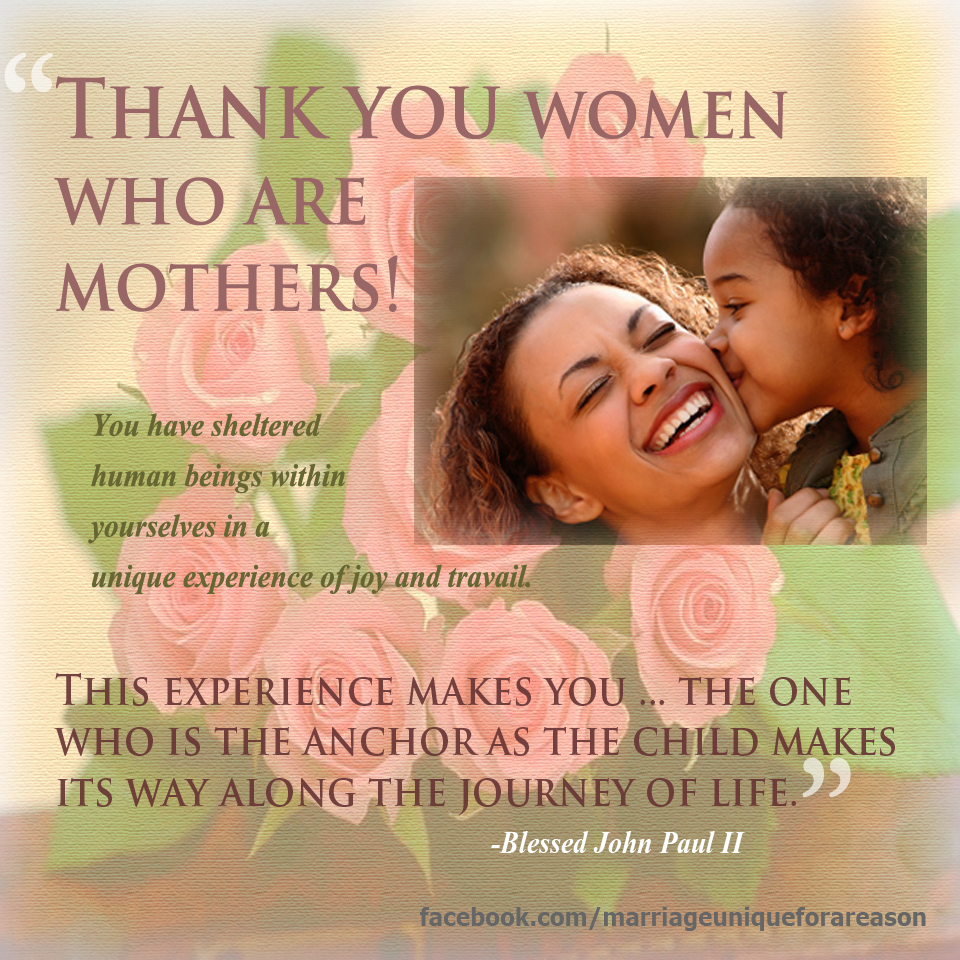
Visit our Facebook page to share this quote with mothers you know!
Archive
Friday Fast: Pray for Mothers
Intention: For mothers: that they may discover the depths of love through their gift of themselves to their children, and in so doing, serve as a witness of the love to which we are all called.
Reflection: In his Letter to Families, Pope Blessed John Paul II reminds us that we can’t “fully find [ourselves] except through a sincere gift of self” (no. 11, quoting Second Vatican Council, Gaudium et Spes, no. 24). The self-sacrifice of a mother’s care for her child reveals the continuous gift of self that love entails and invites others to follow her example. There is no doubt that “love is demanding,” as Bl. John Paul II said. However, “this is precisely the source of its beauty: by the very fact that it is demanding, it builds up the true good of man and allows it to radiate to others.”
We must keep our eyes fixed on Christ, who helps us to see the people in our lives through his eyes and love them with his heart. As we celebrate this Mother’s Day, remembering our own mothers’ gift of life to us, let us take seriously our own call to self-sacrificial love, allowing that love to radiate to others.
Mary, Mother of God, pray for us!
Bl. John Paul II, pray for us!
Did you know? We’ve all heard it said that our hearts become bigger the more we love, but did you know that during pregnancy, a mother’s heart actually physically increases in size? (See: Health on the Net Foundation and British Journal of Radiology).
Also, read more about how we can follow the most perfect example of motherhood in the newest Life Issues Forum column, “Mary, Pro-Life Inspiration.”
More:
- Learn about the Bishops’ Call to Prayer for Life, Marriage, and Religious Liberty
- Sign the pledge to fast on Fridays for life, marriage, and religious liberty
- Join the Call to Prayer Facebook event
Archive
USCCB News Release: Archbishop Cordileone Decries Serious Injustice in Delaware
USCCB News Release (May 8, 2013)
- Redefining marriage in law is a serious injustice
- Children have a right to be raised by mother and father
- Changes meaning of terms regarding marriage, affects birth certificates
“The Delaware Senate passed an unjust bill that attempts to redefine marriage,” said Archbishop Salvatore Cordileone of San Francisco, chairman of the U.S. Conference of Catholic Bishops’ Subcommittee for the Promotion and Defense of Marriage.
“The claim of this bill to redefine marriage is in vain; marriage cannot be redefined, because its unique meaning lies in our very nature. It is also a serious injustice to the most vulnerable among us: children,” said Archbishop Cordileone.
Archbishop Cordileone went on to emphasize the importance of marriage for children. “Marriage is the only institution that unites a man and a woman to each other and to any child conceived of their union,” he said. “Our society either preserves laws that respect the fundamental right of children to be raised by their moms and dads together in marriage, or it does not.”
The Delaware bill also includes further implications of marriage redefinition in the law. For example, the bill states that terms such as “husband” and “wife” denoting a spousal relationship in Delaware law are to apply equally to persons in an opposite-sex or same-sex relationship. The bill also allows two “parents” of the same sex to be entered on the original birth certificate, thus allowing for two mothers or two fathers to be on the certificate.
The Governor of Delaware signed it into law.
Archive
Friday Fast: Pray for those facing adverse prenatal diagnosis or unexpected pregnancy
This week’s intention: For all mothers and fathers facing a poor prenatal diagnosis or unexpected parenthood; that they may know the Lord’s deep love for them and their child and trust in His providential care.
Reflection: There are times in our lives when the path is unclear and the future uncertain. We may not know what lies beyond the present moment, and we may feel frightened and anxious. However, we are not alone. Each of us is deeply loved and cherished by the Father, and we can trust in His care for us, knowing that He pays close attention to our lives: “Not one [sparrow] falls to the ground without your Father’s knowledge. Even all the hairs of your head are counted. So do not be afraid; you are worth more than many sparrows” (Mt 10:29-31). Recognizing the Lord’s love, we can trust that the path on which He leads us is one that leads to our ultimate happiness – even if the path looks different from what we expect. Let us therefore run to our Blessed Mother and ask, as Pope Francis did in a tweet earlier this week, for her aid in helping us know and follow the voice of Jesus, who is the Way, the Truth, and the Life.
Did you know? The following is the optional closing prayer of the Chaplet of Divine Mercy: “Eternal God, in whom mercy is endless and the treasury of compassion — inexhaustible, look kindly upon us and increase Your mercy in us, that in difficult moments we might not despair nor become despondent, but with great confidence submit ourselves to Your holy will, which is Love and Mercy itself.”
Resources are available at the end of this article for those facing poor prenatal diagnoses. If you or someone you know is facing a crisis pregnancy, call 800-712-HELP (4357) or text “HELPLINE” to 313131 for free, confidential help.
More:
- Learn about the Bishops’ Call to Prayer for Life, Marriage, and Religious Liberty
- Sign the pledge to fast on Fridays for life, marriage, and religious liberty
- Join the Call to Prayer Facebook event
Archive
Dr. Jennifer Roback Morse to Rhode Island Legislature: Remarks on redefining marriage and redefining parenthood
As we have mentioned, Rhode Island is one of several states currently facing proposals to redefine marriage to include two persons of the same sex. Bishop Thomas J. Tobin has spoken forcefully on the subject, urging the Rhode Island Legislature not to redefine marriage.
On Tuesday, the Rhode Island Legislature heard prepared remarks from Dr. Jennifer Roback Morse, Ph.D., founder and president of the Ruth Institute, a project of the National Organization of Marriage that aims to promote lifelong marriage to young people. In her statement, Dr. Morse reminded the legislators that she had spoken to them about two years ago, during Rhode Island’s 2011 debate over marriage redefinition, and that many things she predicted in those remarks have since come to pass in places where marriage has been redefined: children with three legal parents, custody disputes with three or more adults, attacks on religious liberty, and removal of gendered language from the law.
In her most recent remarks, Dr. Morse offers another series of predictions about what will happen in law and culture if marriage is redefined. These include:
- continuing the removal of sex differences from the law (example: according to Dr. Morse, the bill being considered in Rhode Island replaces “husbands” and “wives” with the gender-neutral term “parties,” as is anticipated to happen in Washington State; birth certificates in Spain name “Progenitor A” and “Progenitor B,” not “father” and “mother”, a move that the UK is currently debating)
- more aggressive attacks on the natural bond between father, mother, and child (example: blurring the distinction between parent and non-parent, such as if a woman “married” to the mother of a child is considered the child’s second parent, possibly to the exclusion of the child’s father)
Dr. Morse acknowledges that the supporters of marriage redefinition may or may not intend the foregoing. “But I predict,” she continues, “they will be the outcome, the logical result of your marriage policy.” In other words, despite any intentions to the contrary, redefining marriage in law will, as one consequence, entail redefining parenthood. (Dr. Morse details several other consequences.) And how could it not? Saying that men and women are exchangeable as spouses is tantamount to saying that men and women are exchangeable as parents, that fathers and mothers don’t matter to children. (It is commonplace to hear that the number “two” is what matters in parenting, not the gender of the parents, although this prevailing orthodoxy is being challenged by recent studies.) Redefining marriage, and redefining parenthood, are serious matters indeed, and Dr. Morse strongly encouraged the Rhode Island legislators to consider the wide-ranging effects of their decisions.
Dr. Morse’s prescient remarks are worth reading in their entirety. Read them here.
